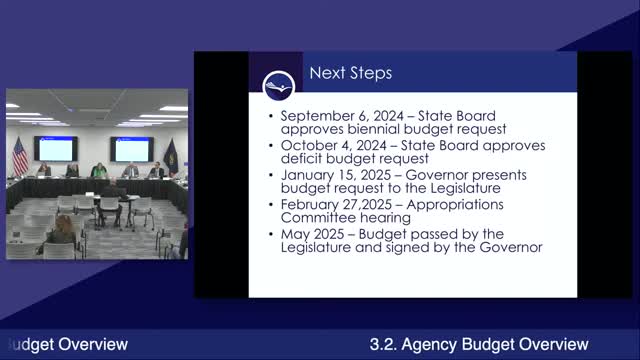State Board hears weak NAEP results, adopts Nebraska literacy plan; mental-health training funding stalls
Get AI-powered insights, summaries, and transcripts
Subscribe
Summary
The Nebraska State Board of Education on Feb. 7 reviewed national benchmark results showing declines in fourth- and eighth-grade reading and debated several literacy and mental-health funding items before approving the Nebraska Literacy Project Plan.
The Nebraska State Board of Education on Feb. 7 reviewed national benchmark results showing declines in fourth- and eighth-grade reading and debated several literacy and mental-health funding items before approving the Nebraska Literacy Project Plan.
Commissioner of Education Matt Maher told the board the NAEP results were “unacceptable” and said the data should be a “call to action” for policymakers and educators. Polly Bowley, Nebraska’s NAEP state coordinator, presented results showing Nebraska’s fourth-grade reading and math scale scores dipped from 2022 to 2024 and that Nebraska was slightly below the national average in reading for fourth and eighth grades.
Board approval of the Nebraska Literacy Project Plan followed public testimony urging the state to build structured-literacy and dyslexia supports modeled on long-running efforts in Mississippi. The board voted 7-1 to approve the literacy plan. Separately, a motion to authorize the commissioner to approve funding for school districts and educational service units to deliver a specified mental-health training program ended in a 4-4 tie and failed. The board also amended a previous motion to accept the comprehensive literacy state development grant funds (motion amended and carried) and approved a separate contract for computer science training (motion carried).
Bowley said NAEP is the only national benchmark that samples schools to produce state-level measures. She reported Nebraska’s 2024 average NAEP scale scores for fourth-grade math at 238 (nation 237) and described small declines in reading since 2022. Commissioner Maher said literacy had been a board priority before the NAEP release and that the results increase the urgency to implement the state plan.
Public commenters pressed the board to prioritize dyslexia identification and structured-literacy training. Teresa Franks, a reading interventionist and certified academic language therapist from Omaha, urged the board to look to Mississippi’s multi-year push to develop dyslexia-trained teachers and to make training accessible and incentivized. Joe Goddard, vice president of the Nebraska Dyslexia Association and a member of the state Family Literacy Advisory Committee, said dyslexia affects roughly one in five students and that Nebraska’s 2017 dyslexia law and subsequent requirements have not been consistently implemented in districts.
Board discussion ranged from technical questions about NAEP sampling to broader policy questions about teacher preparation, screening for dyslexia and the role of the state in enforcing existing statutory requirements. Several board members pressed for more information about which states have improved NAEP outcomes and what specific practices could be adapted for Nebraska.
Votes at a glance: - Amend previously adopted motion to accept comprehensive literacy state development grant funds (motion to strike authorization language and accept grant funds as amended): adopted (roll call: 8 yes). - Authorize commissioner to approve funding recommendations for districts/ESUs to support mental-health staff training (as presented): motion failed on tie vote 4 yes, 4 no. - Authorize commissioner to contract for Computer Science and Technology Education Fund training and support expansion program: adopted (8 yes). - Approve Nebraska Literacy Project Plan: adopted (7 yes, 1 no).
The board’s actions leave the literacy plan and grant acceptance in place and provide funding and contracting authority for other education programs, while the failed motion means the board will not use the statute-allocated funds for the particular mental-health training program as drafted. Commissioner Maher said earlier that the department had been meeting with legislators and that the department stands ready to support districts on literacy and other priorities.
Board members and staff said they will continue analyzing NAEP subgroups and examining exemplars from states that have posted gains. Polly Bowley offered to provide comparative state and subgroup results to board members on request.
The board scheduled continued committee work on implementation details for literacy and other items discussed during the meeting.
